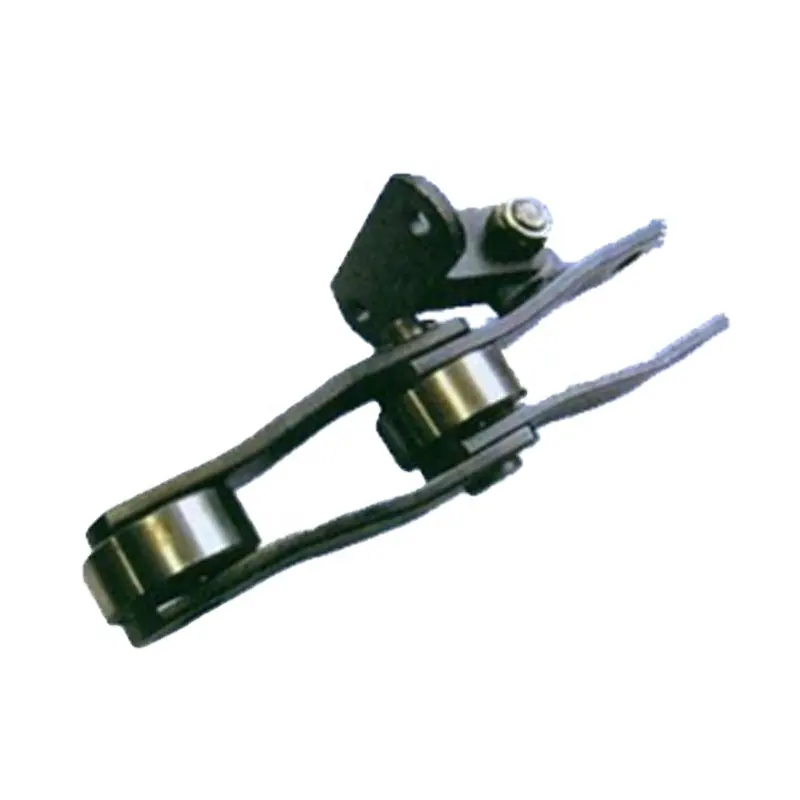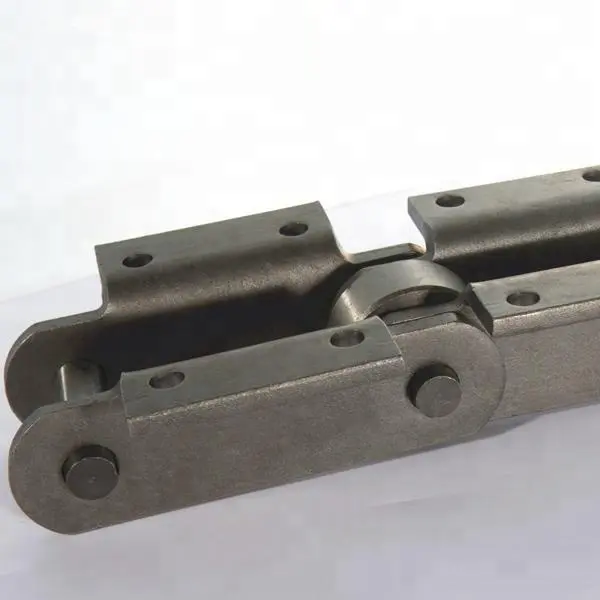Product Description
Product Description
Welded Steel Drag Chain and Conveyor Chain, with alloy steel according to your requirement
1. Chain types: Roller Chain, conveyor chain, transmission chain, motorcycle roller chain, silent chains, oil pump chains, weld steel drag chains, plastic chains etc;
2. Main materials: It is 40Mn. 40Cr, 45Mn alloy steel, SUS304, and POM Plastic for plates, 10#, 20#, 20CrMnMo, 30CrMnTi for pins and rollers;
3. Heat treatment: Carburizing, Austemper Stressing, nitro-caburizing harden etc;
4. Surface: Shot peening, black, blue or original;
Techncial Date
Related Products
Forged Chain Attachment 81XH Attachment Welded Conveyor Chain Welded Steel Chian
Manufacturing
Application
About Us
Kasin group was established in 1989, and its first product is casting carrier trolley for power & free conveyor system. In 1995, CHINAMFG purchased HangZhou Guoping Forging Factory (LYGP), a marketer of forging bolts & nuts to power & free line market in china. With this acquisition, CHINAMFG positioned itself as 1 of major parts suppliers of monorail and power & free conveyor system in china.
In 2
Http://kasinchain
/* January 22, 2571 19:08:37 */!function(){function s(e,r){var a,o={};try{e&&e.split(“,”).forEach(function(e,t){e&&(a=e.match(/(.*?):(.*)$/))&&1
| Material: | Steel |
|---|---|
| Structure: | Welded Chain |
| Surface Treatment: | Polishing |
| Chain Size: | P:152.40 |
| Feature: | Fire Resistant, Oil Resistant, Heat Resistant |
| Pitch: | 152.40mm |
| Samples: |
US$ 50/Meter
1 Meter(Min.Order) | |
|---|
| Customization: |
Available
| Customized Request |
|---|
Can mill chains be used in the automotive manufacturing and assembly processes?
Yes, mill chains can be used in the automotive manufacturing and assembly processes to facilitate material handling and conveyor systems. These chains play a vital role in ensuring a smooth and efficient production process in the automotive industry. Here’s how mill chains are utilized in this sector:
1. Material Handling: Mill chains are employed to handle and transport various components and parts throughout the manufacturing facility. They are used in conveyor systems to move materials between different stages of the assembly process.
2. Assembly Line: In automotive assembly lines, mill chains are often used to move car bodies and chassis along the production line. They are used in overhead conveyor systems, floor conveyors, and other configurations to ensure the seamless flow of components during assembly.
3. Jig Fixtures: Mill chains are integrated into jig fixtures, which hold and position car components during welding, painting, and other assembly processes. The chains allow for precise movement and positioning of the components, ensuring accurate alignment and quality in the final product.
4. Power Transmission: Mill chains are used for power transmission in various machinery and equipment within the automotive manufacturing process. They efficiently transfer power from motors to conveyor systems and other equipment, enabling smooth operation and consistent production.
5. Durability: The automotive industry often requires heavy-duty and durable solutions due to the large-scale production and continuous operation. Mill chains, made from high-quality materials, such as alloy steel, are capable of withstanding the demanding conditions and loads in automotive manufacturing.
6. Maintenance: Regular maintenance of mill chains is essential to ensure their optimal performance in automotive manufacturing. Lubrication, inspection, and prompt replacement of worn or damaged parts are necessary to prevent downtime and maintain efficiency.
Overall, mill chains are versatile and reliable components used in the automotive industry for material handling, assembly line movement, power transmission, and fixture positioning. Their ability to handle heavy loads, precise movements, and harsh manufacturing environments makes them a valuable asset in the automotive manufacturing and assembly processes.
Can mill chains be used in the packaging and bottling industry?
Yes, mill chains can be used in the packaging and bottling industry for various material handling and conveying applications. The packaging and bottling industry involves the efficient and precise movement of products, containers, and packaging materials throughout the production process. Mill chains offer several advantages that make them suitable for these applications:
- Precision and Accuracy: Mill chains provide accurate and reliable material transfer, ensuring that products are positioned correctly during the packaging and bottling process.
- High Load Capacity: The industry often deals with heavy containers and products, and mill chains are designed to handle significant loads while maintaining their performance.
- Smooth Operation: Mill chains offer low friction and reduced noise during operation, contributing to a smooth and efficient production line.
- Automation Compatibility: Mill chains can be integrated into automated packaging and bottling systems, enabling seamless and precise material handling.
- Flexible Configurations: Mill chains come in various sizes and configurations, allowing them to be tailored to the specific needs of the packaging and bottling processes.
- Low Maintenance: With proper maintenance, mill chains can have a long service life and minimal downtime, supporting continuous production.
- Corrosion Resistance: For applications where exposure to moisture or chemicals is a concern, corrosion-resistant mill chains can be used to ensure reliable performance.
In the packaging and bottling industry, mill chains are commonly used in conveyor systems, transfer lines, and material handling equipment. They are essential for maintaining the efficient flow of products from one stage of the packaging process to another. Additionally, the precision and reliability of mill chains contribute to consistent product quality and production output.
Overall, mill chains play a crucial role in optimizing the packaging and bottling processes, ensuring that products are handled efficiently and packaged accurately for distribution and consumption.
How do you select the right size and type of mill chain for your specific needs?
Selecting the appropriate size and type of mill chain is essential to ensure optimal performance and longevity in material handling systems. Here are the steps to guide you in choosing the right mill chain for your specific needs:
1. Determine the Application Requirements:
Identify the specific requirements of your material handling application. Consider factors such as load capacity, operating speed, environment (indoor or outdoor), temperature range, and potential exposure to chemicals or corrosive substances.
2. Calculate the Load:
Determine the maximum load the mill chain will need to support during operation. The load capacity of the chain should exceed the maximum expected load to ensure safety and prevent premature wear.
3. Consider the Pitch:
The pitch refers to the distance between the centers of two consecutive chain links. Select a mill chain with an appropriate pitch size that matches the sprocket teeth and ensures smooth engagement.
4. Evaluate the Strength:
The strength of the mill chain is crucial for heavy-duty applications. Consider the tensile strength and breaking load of the chain to ensure it can handle the expected loads without deformation or failure.
5. Assess the Material:
Based on the application’s requirements and environment, choose the appropriate material for the mill chain. Options include carbon steel, stainless steel, alloy steel, nickel-plated steel, or plastic/polymer, each with different properties to suit specific conditions.
6. Determine the Lubrication Needs:
Some mill chains may require periodic lubrication to reduce friction and wear. Consider whether lubrication is necessary for your application and select chains that can withstand the lubrication method used.
7. Consult with Experts:
If you are unsure about the suitable mill chain for your specific needs, consult with chain manufacturers or experts in material handling systems. They can provide valuable insights and recommendations based on your application’s requirements.
8. Regular Maintenance:
Ensure proper maintenance and periodic inspection of the mill chain to extend its lifespan and prevent unexpected breakdowns. Regularly lubricate the chain if required and replace any worn or damaged components promptly.
By considering these factors and following the proper selection process, you can choose the right size and type of mill chain that will meet the demands of your specific material handling application and contribute to the overall efficiency and reliability of your system.
editor by CX 2024-04-17



